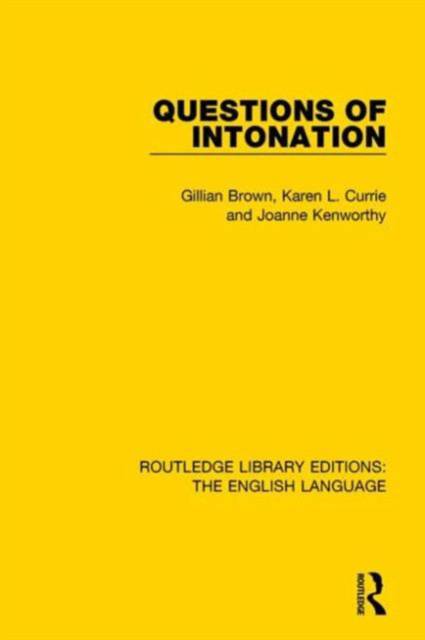
- Retrait gratuit dans votre magasin Club
- 7.000.000 titres dans notre catalogue
- Payer en toute sécurité
- Toujours un magasin près de chez vous
- Retrait gratuit dans votre magasin Club
- 7.000.0000 titres dans notre catalogue
- Payer en toute sécurité
- Toujours un magasin près de chez vous
Description
First published in 1980, this book questions many of the assumptions that have accumulated around the subject of intonation as it occurs in spontaneous speech, as well as texts read aloud. The book suggests alternative ways of examining the subject and primarily uses data derived from Edinburgh speech, which is explicitly compared with descriptions of standard southern English.
The book critically examines many conventional assumptions made about the formal features of intonation, particularly 'tonic' or primary stress', and about the functions of intonation, specifically rising intonation. A model of intonation is presented which demonstrates that the limited resources of intonation are exploited by several different expressive systems. This approach is justified in detailed analysis of extensive stretches of speech, supported by instrumental analysis as well as by experiments which elicit judgements by both naïve and phonetically trained judges.
This book will be of interest to students of linguistics, English Language, speech therapy, and English as a Foreign Language, as well as historians interested in the history of language.
Spécifications
Parties prenantes
- Auteur(s) :
- Editeur:
Contenu
- Nombre de pages :
- 208
- Langue:
- Anglais
- Collection :
Caractéristiques
- EAN:
- 9781138917972
- Date de parution :
- 25-06-15
- Format:
- Livre relié
- Format numérique:
- Genaaid
- Dimensions :
- 156 mm x 234 mm
- Poids :
- 471 g

Les avis
Nous publions uniquement les avis qui respectent les conditions requises. Consultez nos conditions pour les avis.






